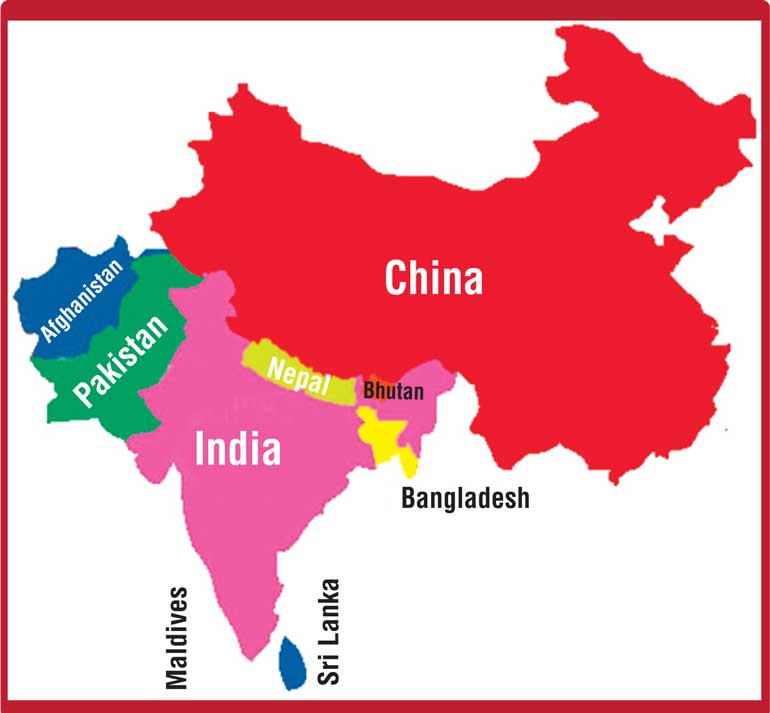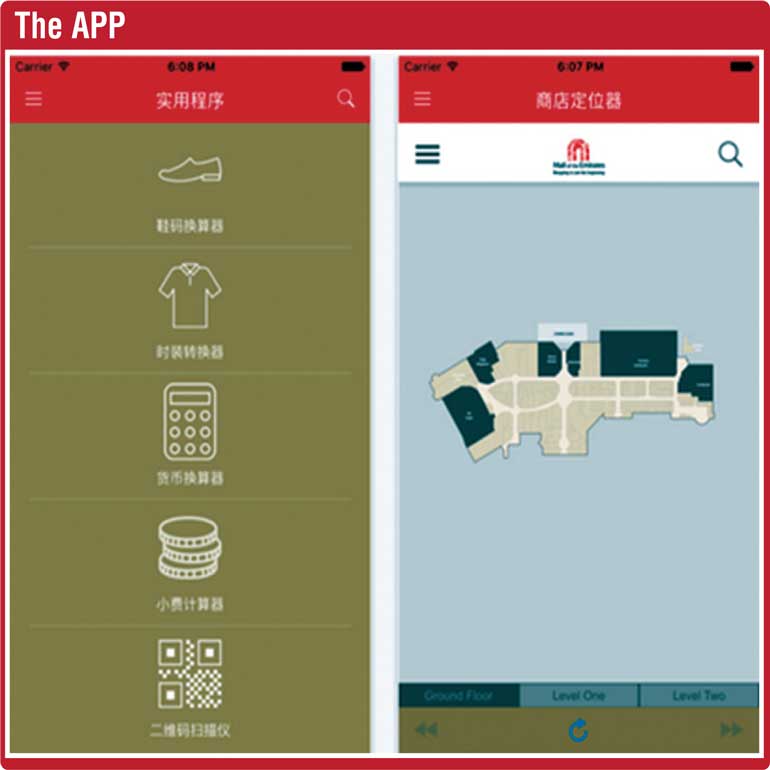Monday Feb 16, 2026
Monday Feb 16, 2026
Wednesday, 4 April 2018 00:00 - - {{hitsCtrl.values.hits}}


 Situation analysis
Situation analysisThe negative growth in inbound tourism from China -1.0% for period January to December 2017 compared to same period 2016 indeed should be of concern to all stakeholders in hospitality and aviation and travel industries. While this being the case for Sri Lanka, Dubai up to September 2017 received 573,000 Chinese tourists, 49% increase over 2016. So far this year 2018 the data for Sri Lanka is positive with the first two months showing a +5.5% growth compared to same period 2017.
To analyse and find out the reasons for the exponential growth of Chinese tourism to Dubai in 2017 compared to 2016 thus may be of importance for tourism authorities of our nation.
On the other hand, in 2016 for same period January to February the growth from China was 48.8% and the annual growth over 2015 was 26.4%, while the total tourist arrival growth for the whole year over 2015 being 14%.
As per www.attractchina.com, the top 10 activities that attract Chinese Tourists are as follows.
1.Shopping.
2.Visiting landmarks.
3.Golfing.
4.Seeking medical care – (Medical Tourism and here we already have two JCI accredited hospitals, Durdans and Asiri Central).
5.Gambling.
6.Buying properties.
7.Honeymoon.
8.Cruising.
9.Self-driving.
10.Visiting schools.
In the early days of tourism, the demographics played a very important role in market segmentation. But today the key influencer in market segmentation is psychographics, the attitudinal aspects of the consumer or the Unique Buying Proposition (UBP) of the consumer.
A market segment is defined as, “group of customers with similar needs and wants and to whom you develop a specific offer with a differential advantage over those of your competitors”
Yet the fast evolution of the consumer’s needs and wants and the change in the market place necessitates understanding how others rake in business while you are lagging behind.
A broad segmentation would reveal,
“With the Chinese expected to soon become the largest outbound tourist market on the planet, you would expect grateful recipients in the West to be gearing up for the influx?
Sadly, not.
Whilst a number of travel brands and destination marketers are making an extra effort to better serve this growing number of Chinese travellers, a recent study shows that many London hoteliers remain mute to how this demographic (affluent, eager to explore) engage in social media.
It isn’t all about Twitter, for starters, meaning they are missing a golden opportunity.
A study of over 100 leading hotels (including 87 five-star and 15 four-star properties) in the UK capital found only six had a presence in a Twitter-esque service in China, Weibo, a brand which over 500 million use.
Within these six properties in Weibo, two hotels had yet to post any content, and three were just re-purposing existing material without any form of localisation, a key factor to consider when targeting Chinese travellers.
Only one, the May Fair Hotel, is in active participation in Weibo and posts fresh content on a regular basis.
The London-based hotels on Weibo inevitably have far fewer followers than most hotel accounts in China, with even the most-followed property in the capital on Weibo capturing only 1% or less of the followers of popular hotels in Beijing or Shanghai.
Perhaps even bigger omission from the social media pool in China was the lack of a presence in WeChat, an online messaging and social networking platform with over 400 million users.
WeChat is considered a useful travel industry-related service, with a string of features such as the ability to hail a taxi on demand, and the ability to book flights.
The study, from UK-based travel consultancy China Edge, concludes by saying that London hoteliers are yet to utilise the full potential of Weibo and WeChat services, given the fact that London attracts a higher percentage of independent Chinese travellers than many cities around the world.
Many Westerners (we do this at Tnooz) talk to Chinese travel brands via WeChat. Often a senior representative from a Chinese travel company will be available via WeChat, or a company’s official account page in WeChat is used to answer questions.
Often the response time for brands using these channels is far higher than other methods, with travel brands often responding on their official pages in WeChat within ten seconds, whereas in Twitter, the average response time easily is always over one hour.”
Indeed, as per the latest available information Australia, UK and Dubai Tourism authorities have joined hands with WeChat to power Chinese inbound tourism to those countries.
(http://www.traveldailymedia.com/434584/wechat-will-prep-chinese-dubai-uk-australia-cityexperience-programme/http://www.traveldailymedia.com/434584/wechat-will-prep-chinese-dubai-uk-australia-cityexperience-programme/)
Dubai hotels, malls, airport and inbound operators have increased the number of mandarin speaking customer service agents. Chinese payment systems such as UnionPay bank card are widely used.
Mall of the Emirates, the world-known luxury shopping mall in Dubai, in the United Arab Emirates (UAE) launched a new mobile application, thought in details especially for Chinese customers. Indeed, the shopping centre recognises the potential of Chinese shoppers so they created a mobile application for them to enjoy more their shopping experience and their stay in Dubai.
The application gives few additional functions for Chinese customers regarding their pre-arrival and their journey in Dubai: they can access information about Dubai and the Mall of the Emirates, they can benefit from a holiday planner, a store locator, a currency converter, a tip calculator. It also gives information about tourist and beach attractions, weather, travel tips, VIP tours etc. and details about the range of luxury fashion brands, jewellers, watchmakers and dining and entertainment options available to consumers, as part of the service aimed at Chinese Outbound Tourists.
Here are few key pointers as per www.chinatouristagency.com for hoteliers to practice to attract direct bookings.
As the industry continues to usher in this new era of revenue management, properties will be gathering more data on guest segments, room types, historical booking, reservations data and length of stay. For a large property, that could add up to several hundred million observations. The right system not only scales to accommodate consistent data growth, it also lets users intuitively access only what information they need when they need it.
It’s also not enough to take a one-size-fits-all approach to choosing and managing revenue technology. Ultimately, that will not provide the information needed to continue to successfully appeal to our increasingly sophisticated guests, who are not as loyal to their brand as they are their search engine and mobile device.
Instead, the best hospitality revenue management solution has to be customisable and flexible. Guests are looking for a one-of-a-kind experience in entertainment and lodging and the system itself has to reflect that. At the same time, an investment should not need significant modifications. Instead, it would provide sort data with predefined parameters and alerts, with dashboard views based on roles and goals.
Hoteliers need to look at a revenue management solution’s integration compatibility with key systems across the property. Interconnectivity between the hotel property management system (PMS), marketing and sales, and distribution technology puts even more power into the hands of the user.
The ability to handle group sales is another important factor in successful revenue management. Hoteliers should be able to see suggested dates for flexible groups based on projected demand. This provides answers to crucial questions such as how many customer groups, by size, can be accommodated on a given day. Rooms are then priced accordingly. (https://ehotelier.com/insights/2018/03/15)
What this means is the need to understand the UBP of your customers. It is no longer feasible to develop marketing strategies with the USP of the hospitality plant, but the need to understand the intricate web of data that create the UBP of each customer.
It would thus appear that while Sri Lanka continuing to increase thrust into the existing market segments, there is need to develop a marketing cum promotional strategy for engaging the shoppers. The increasing affluence has made Chinese people high in self-conceit and the ingredient that feeds their conceit is high quality and branded shopping. After all, the word Brand came from the Old Norse language word BRANDR meaning TO BURN. Thus what brands do is burn the consumer’s mind with all their features and clearly digital marketing has become a key influencer in this sphere.
Unlike Dubai which has the huge Emirates Mall, our shopping is spread out not just in Colombo but in the countryside too. Therefore, it is important to bring them in together where Chinese shoppers can buy not only international but top quality local brands too, and there is a cluster of such brands many of which are eco-friendly and designed to fight global warming.
Between 18 to 31 October I was in Anuradhapura in a meditation retreat and spent two days going in and coming out in a hotel with about 24 rooms. Both days I was the only guest. I hardly saw a Chinese in Anuradhapura but many western tourists were there.
Anuradhapura is an iconic city of over 2,300 year’s vintage. It is the only living city in this world that lived in the present all the time and that too for over 2,300 years.
Anuradhapura was and is living because of the presence of Dhamma and that can be experienced by all with meditation. Of course in the retreat I was, there were Germans, Swiss people, Australians and even Chinese and Indians as well as a Muslim lady from our nation in meditation for over 10 days. For the average tourist such retreat is difficult, but by organising and incorporating hour or so sessions on couple of days in the hotels to a normal tour can help tourists in building wellness. Under Heritage, in the Tourist Authority website Anuradhapura is there, but how one can build inner wellness is not featured in this living city. These iconic places are also part of our USP.
According to Mental Health Foundation UK 2016 report for year 2014:
“This year’s Fundamental Facts follows the recent publication of the 2014 Adult Psychiatric Morbidity Survey (APMS). This highlights that, every week, one in six adults experiences symptoms of a common mental health problem, such as anxiety or depression, and one in five adults has considered taking their own life at some point. Nearly half of adults believe that, in their lifetime, they have had a diagnosable mental health problem, yet only a third have received a diagnosis. The APMS brings to the fore the widening gap between the mental health of young women and young men. Women between the ages of 16 and 24 are almost three times as likely (at 26%) to experience a common mental health problem as their male contemporaries (9%) and have higher rates of self-harm, bipolar disorder and posttraumatic stress disorder. This is clearly an issue that needs a deeper look and a strategy for addressing the factors that are causing it.”
Our nation has much that can be given to this world.
Also a word about our nation brand pay-off line. Here are some that changed their tagline.
Our tagline for many years now is “Wonder of Asia”. But does the tagline spell out our USP and does it rhyme with consumer UBP?
(The writer can be reached at [email protected], [email protected].)